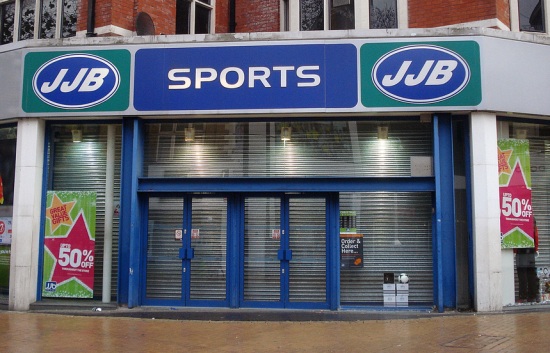The past few months have seen troubled retailer JJB Sports go through a great deal of turbulence in terms of the future for the business. Plunging sales figures and mounting debts are never good news for any business, but with competition from Sports Direct, it seemed highly unlikely that the sporting goods retailers would be able to pull through their most recent set of troubles.

Earlier this week, the chain announced that it would be appointing administrators in the very near future after failing to find a buyer for the business, with the decision to suspend shares for the company made on Monday 24th September. However, this appears to be simply a form of damage control, as a statement from the chain revealed that any offer made for the company would not allow shareholders to recoup any of their investments.
Whilst stores around the country will continue to trade throughout the administration period, at least until a sale on the business has been negotiated and completed, the news comes as a grim blow to the chain’s 4,000 staff. It is expected that around half of JJB Sports’ stores nationwide will close after a buyer has been found, spelling a great deal of trouble ahead for employees.
Mike Ashley, owner of football club Newcastle United and rival chain Sports Direct, is the favourite to win in the battle for JJB Sports’ assets. However, while he is likely to be able to pick up a large percentage of the business, the exact number of stores he will be able to absorb into Sports Direct remains uncertain. This is because the sale will be closely monitored by the competition watchdog, to ensure the playing field in the sporting retail field remains relatively even.
JJB Sports has seen its fair share of problems in the past few years; with cracks in the business emerging even before the double dip recession began to have an effect upon British businesses. Largely thanks to strong competition from rivals Sports Direct and JD Sports, the company saw falling sales figures and less footfall in its commercial properties despite efforts to keep the business afloat.
Despite numerous methods of raising money being trialled over the years, JJB Sports continued to struggle, especially when the financial crisis began to bite in the UK. Fundraisers failed to conjure the resources needed to pay for the rebranding the chain desperately needed to attract consumers back into stores, and even the closure of half of its UK property portfolio failed to attract the interest of the British public.
Professional services provider KPMG is expected to appoint the administrators responsible for selling on the business, with all involved hoping for a quick sale to help pay off the debts accrued by JJB Sports over the years.
A statement was released by JJB Sports following the suspension of shares on Monday.
It said; “The Board has determined that any sale of the trade, assets and brands will be effected through an administration process.
“Therefore it is expected that the process to commence the appointment of administrators to the company and certain of its subsidies will begin today although the actual appointments are only likely to take effect just before the completion of any such sale.”
JJB Sports is not the first high street business to face administration during the economic crisis by far – earlier this year, high street favourites Clinton Cards was in the same situation, with the brand being bought out by suppliers American Greetings. The GAME Group, Peacocks clothing retailers and even designer brands such as Aquascutum have also succumbed to the administration process since the beginning of this year.
With high street brands vanishing before our eyes, it must be hoped that the double dip recession is resolved soon, and that retailers can begin to attract consumers with a higher level of disposable income back to their stores, before the nation’s town centres are abandoned entirely.
Do you think anything can be done to save classic high street brands such as JJB Sports, or is the collapse of this type of business just part of the nature of retailing? Is the financial crisis really the main cause of retail administrations, or do you believe that competition from rival chains plays a larger part?
Previous Post
UK Commercial Property Rents Down for a Full Quarter